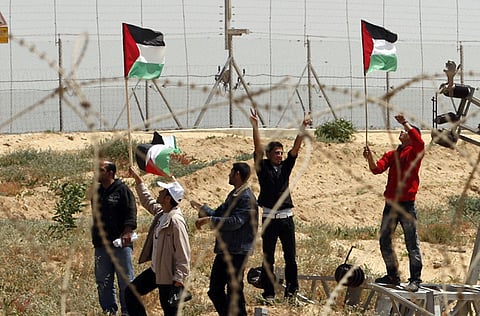No peace without pressure
There will be no resolution until the US takes a tougher stance against Israel

More than 20 years ago, many Americans decided they could no longer watch as racial segregation divided South Africa. Compelled by an injustice thousands of kilometres away, they demanded that their communities, their colleges, their municipalities, and their government take a stand.
As Martin Luther King Jr said, "Injustice anywhere is a threat to justice everywhere."
Today, a similar discussion is taking place on campuses across the United States. Increasingly, students are questioning the morality of the ties US institutions have with the unjust practices being carried out in Israel and in the Occupied Territories. Students are seeing that these practices are often more than merely "unjust." They are racist. Humiliating. Inhumane. Savage.
Sometimes it takes a good friend to tell you when enough is enough. As they did with South Africa two decades ago, concerned citizens across the US can make a difference by encouraging Washington to get the message to Israel that this cannot continue.
Americans are heavily involved in the conflict: from funding (the US provides Israel with roughly $3 billion [Dh11 billion] annually in military aid) to corporate investments (Microsoft has one of its major facilities in Israel) to diplomatic support (the US has vetoed 32 United Nations Security Council Resolutions unsavoury to Israel between 1982 and 2006).
Why do I care? I am an Israeli. Both my parents were born in Israel. Both my grandmothers were born in Palestine (when there was no "Israel" yet). In fact, I am a ninth-generation native of Palestine. My ancestors were among the founders of today's modern occupied Jerusalem.
Some of the acts of segregation that I saw while growing up in Israel include towns for Jews only, immigration laws that allow Jews from around the world to immigrate but deny displaced indigenous Palestinians that same right, and national health care and school systems that receive significantly more funding in Jewish towns than in Arab towns.
As former prime minister Ehud Olmert said in 2008: "We have not yet overcome the barrier of discrimination, which is a deliberate discrimination and the gap is insufferable ... Governments have denied [Palestinians living in Israel] their rights to improve their quality of life."
Intolerable
The situation in the Occupied Territories is even worse. Nearly four million Palestinians have been living under Israeli occupation for over 40 years without the most basic human and civil rights.
One example is segregation on roads in the West Bank, where colonists travel on roads that are for Jews only, while Palestinians are stopped at checkpoints, and a 16-kilometre commute might take seven hours.
Another example is discrimination in water supply: Israel pumps drinking water from the Occupied Territories (in violation of international law). Israelis use as much as four times more water than Palestinians, while Palestinians are not allowed to dig their own wells and must rely on Israeli supply.
Civil freedom is no better: In an effort to break the spirit of Palestinians, Israel conducts sporadic arrests and detentions with no judicial supervision. According to one prisoner support and human rights association, roughly four in 10 Palestinian males have spent some time in Israeli prisons. That's 40 per cent of all Palestinian males!
And finally, perhaps one of the greatest injustices takes place in the Gaza Strip, where Israel is collectively punishing more than 1.5 million Palestinians by sealing them off in the largest open-air prison on earth.
We must lift the ruthless siege of Gaza, which only breeds more anger and frustration among Gazans, who respond by hurling primitive, homemade rockets at Israeli towns.
We must remove travel restrictions from West Bank Palestinians. How can we live in peace with a population where most children cannot visit their grandparents living in the neighbouring village, without being stopped and harassed at military checkpoints for hours?
Finally, we must give equal rights to all. Regardless of what the final resolution will be — the so-called "one state solution," the "two state solution," or any other form of governance.
Israel governs the lives of 5.5 million Israeli Jews, 1.5 million Palestinians living in Israel, and four million Palestinians in the West Bank and Gaza. As long as Israel is responsible for all of these people, it must ensure that all have equal rights, the same access to resources, and the same opportunities in education and health care. Only through such a platform of basic human rights for all humans can a resolution come to the region.
If Americans truly are our friends, they should shake us up and take away the keys, because right now we are driving drunk, and without this wake-up call, we will soon find ourselves in the ditch of an undemocratic, doomed state.
Jonathan Ben-Artzi was one of the spokespeople for the Hadash party in the Israeli general elections in 2006. His parents are professors in Israel, and his extended family includes uncle Benjamin Netanyahu.
Sign up for the Daily Briefing
Get the latest news and updates straight to your inbox


